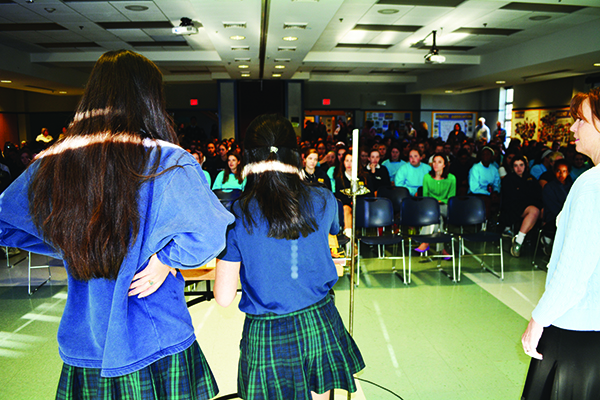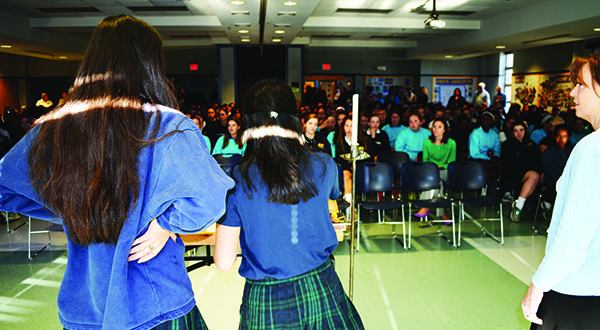by Arianna Scott and Nora Gosselin

Presidential candidates have used campaigning throughout this nation’s history, skillfully drawing in more active support and sparking impassioned reactions. Political campaigning, as old as our nation itself, is seen as advantageous and democratic– an expression of our freedom of speech, a strengthening of the open forum ideally at the heart of government and an opportunity for the average American to engage in the processes that lead to the highest office.
Here at Stone Ridge however, campaigning is viewed in a much different light. While our school has seemingly endless opportunities for elected student leadership, this year school administration does not permit campaigning of any form–even for the most demanding and involved positions, such as Core Group President and Vice President, Head of Athletic Association, and Class President. This ban on campaigning, a central tenet of any democratic process, raises some interesting questions about the legitimacy of our election process. Should an educational institution that so values and “empowers leaders,” according to its own mission statement, consider permitting pre-election campaigning as intrinsic to actual democracy?
Prior to election day, candidates running for Class President are only allowed to voice their goals for the upcoming school year on an application, posted for voters to read. On election day candidates give a two-minute speech in which the are expected to outline their qualifications and hopes for the position. Distinguishing oneself from the competition is incredibly difficult within this time limitation. And really– is a two minute speech representative of the all duties that come with being class president? These duties include frequent public speaking during both class meetings and school wide events that require representation from each grade. Some students have expressed that they cannot make an informed voting decision following a mere two minute speech for position that, as mentioned, is defined by oratory proficiency. What’s more, although the ban on campaigning is intended to eliminate the influence of popularity upon the race, it can easily work to quite the opposite effect. Two minute speeches mean that students are not fully aware of the candidate’s plans for the position and therefore end up voting for the person they know best, rather than for the one who can hold the office best.
Colin Barnes ‘16 shares that, in her opinion, when there isn’t campaigning “you don’t really know what the candidate’s vision is. What can you really say in two minutes? I feel like there are important things that [the candidates] need to make known” and are unable to within the two minute window. She adds that “everyone just votes for their friends, thinking ‘I like them so they will be a good leader.’”
Similarly, the Core Group President and Vice President, perhaps the two most highly regarded positions at Stone Ridge, must skillfully convey their ambitions for the entire student body in a mere four minute speech. With the hopes of distinguishing themselves from their opponents, Core Group candidates would often compose songs or raps to entertain the audience within the four minute confines. This year, however, for the first time, songs and raps (and really singing or dancing of any form) have been prohibited to candidates. The rationale behind this decision was that it would ideally encourage the Core Group President and Vice President to spend more time speaking on serious goals instead of attempting to entertain through song and dance.
Core Group President and Vice President are required to publicly speak often, especially at every day at morning assembly, as well in a variety of meetings to plan school wide events. Their responsibilities do requires a degree of seriousness. However, jokes often invigorate routine assemblies and comedy is a great way to communicate, so should Core Group candidates be allowed to exhibit their sense of humor during their speeches?
Candidates for the Head of the Athletic Association are permitted only two minutes of speaking time. This two minute speech must aptly reflect the responsibilities of someone who promotes school wide spirit for sports teams, encourages students to come to games, and plans athletic events with the rest of the Athletic Association.
In addition to helping voters make informed decisions, campaigning would provide students with a taste of college-level student government. Natasha Armstrong ‘14, former Core Group President, launched a campaign for a leadership position at Emory University this past March on Facebook. She won the election, along with two other sophomore representatives. Natasha’s election as Emory University’s Student Government Association (SGA) sophomore representative proves that campaigning is a useful and effective tool for achieving success in college-level student government. Exposure to these politics in high school would have likely proved helpful to Natasha and to all future Stone Ridge girls who pursue positions in college.
However, when considering campaigning in the context of college, one must also factor in the size of each school. Due to the enormity of most colleges, students often do not know every candidate personally. Therefore, campaigning plays a more critical role in college government elections. Stone Ridge, in comparison, is a fairly small establishment that prides itself on a strong sense of community. In this context, one could argue that campaigning is unnecessary, since students generally know all their classmates, not just their close friends. Therefore, they can make informed decisions at the polls.
Another concern with campaigning is that it has the potential to transform into the mere discrediting of other candidates. Without any sort of guidelines, it could become nothing more than a bribery competition where candidates resort to to buying votes in covert manners such as bake sales. There is also the potential for these campaigns to turn into competitions over who can spend the most money. In these instances, there can be no denying the blatant injustice of an unlimited campaigning system.
These are the concerns that Mrs. Fries, Dean of Students and key member of the Upper School administration, shared in a recent interview with the Here and Now. Moving forward however, she shared that the administration is considering allowing a poster or two, so that “there could be some level of campaigning, but not [the level of] gift-buying campaigning.” She also notes the mixed opinions on the current campaigning system (or lack thereof). Some candidates have complimented the administration for its policy, since it allows candidates to “focus on what they want to focus on and avoid spending time on designing slogans and posters.” She adds that, despite campaigning’s potential inequities, its prohibition is “not something written in stone that can’t ever be changed, [especially] if there’s interest in changing it and good reasons to.”

Leave a Reply